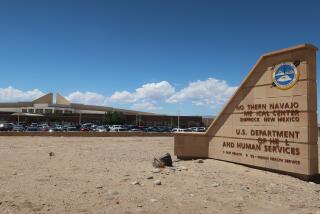Distress Over Health System Seen Growing
WASHINGTON — Americans are more fearful about whether they can afford high-quality medical care than at any time in modern history and they increasingly view doctors, hospitals and insurance companies as profiteers, according to analysts and new surveys.
“They feel they are paying more and getting less while providers are profiting,” New York pollster Joel Baumwoll said of the results of a poll that he designed for the National Coalition on Health Care.
Widespread consumer alienation is also the central finding of a poll to be released Monday by the American Hospital Assn. Its survey of 23,000 patients found that many see themselves as increasingly unable to control their own medical care and daunted by the prospect of navigating a complex system that they no longer understand.
“There’s a serious problem with today’s health care system. It’s not just about Medicare or Medicaid, it’s about the entire delivery system,” said Dr. Henry E. Simmons, president of the nonpartisan National Coalition on Heath Care, which released its survey Thursday.
Its findings and those of other surveys are prompting speculation among some analysts that Congress and the Clinton administration might be emboldened to consider broader health care reform measures than those now being discussed. To date, however, there has been no serious discussion of going beyond proposals to extend coverage to the nation’s estimated 10 million uninsured children.
The health care coalition’s nationwide poll found that 80% of Americans believe that something is “seriously wrong” with the system and 87% say the quality of care needs to be improved, with eight of 10 blaming the profit motive for compromising quality.
The coalition has as its honorary co-chairmen former presidents Gerald R. Ford and Jimmy Carter, and it is made up of nearly 100 groups that employ or represent 100 million Americans. Its members include major airlines, auto makers, labor unions, medical societies, consumer groups and some insurance companies.
In some of the poll’s more striking results, only 15% said that they have “complete confidence” in hospital care, while just 44% expressed confidence that the health care system will “take care of me.”
“The public mood is clear: Their trust has been shaken,” Baumwoll said.
Contrary to public perception, a strong majority of Americans (72%) wants government to play a role in cost containment and quality assurance, the coalition’s survey found.
In that same vein, a Kaiser Family Foundation-Harvard University poll last week reported that 60% of respondents believed the plight of the uninsured, now numbering 40 million Americans, has worsened in this decade and should be addressed.
The recent health care surveys come at a time when health economists are warning that medical costs, which have lagged behind overall inflation for three years, are beginning to accelerate again and may be poised for a sharp increase. Such increases could renew corporate efforts to cut medical costs by passing them on to employees, thus further arousing consumer anxiety.
In all, the surveys predicted that inflation could cause Congress to consider health reforms that go beyond the current White House and congressional discussions of extending coverage to uninsured children, some analysts say.
“Maybe members don’t quite view this as the issue from hell anymore--as they did a year or two ago,” said Drew Altman, head of the Kaiser Family Foundation, a nonprofit, California-based health care research organization.
Altman said that Congress might be persuaded to build on the modest reforms it enacted last year, such as a bill to ensure insurance portability and another to require a minimum number of hospital days before a woman may be discharged after giving birth.
Such optimism, however, was nowhere to be found during a series of interviews with focus groups--whose participants are screened to provide a balance of interests and views--conducted by the health care coalition before its nationwide survey.
“The prevailing view expressed in these interviews was that improvements in the health care system were being held hostage by partisan politics,” Baumwoll said.
The coalition’s survey, conducted in late December, followed 10 focus groups with 120 Americans in five cities, including Los Angeles. The sessions “revealed a depth of anger, fear and betrayal combined with a sense of frustration and pessimism for the future of health care”--sentiments that were strongly echoed in the ensuing survey, Simmons said.
“The vast majority of Americans feel that the system now puts profits ahead of care for people,” he said.
“Many Americans feel alienated from the health care system and are worried [that] they may be the next to lose their health insurance coverage,” Simmons added. “But most disturbing to us was the serious concern voiced about the quality of medical care and the lack of trust in our system.”
The survey found that the level of dissatisfaction and mistrust was not confined to customers of managed care organizations, which generally are more cost conscious and offer fewer choices of providers than fee-for-service insurance plans, under which participants are free to choose their doctors.
“It’s time for policy-makers and leaders to take notice,” said Morton Bahr, president of the Communications Workers of America.
More to Read
Sign up for Essential California
The most important California stories and recommendations in your inbox every morning.
You may occasionally receive promotional content from the Los Angeles Times.










